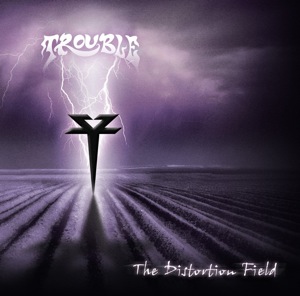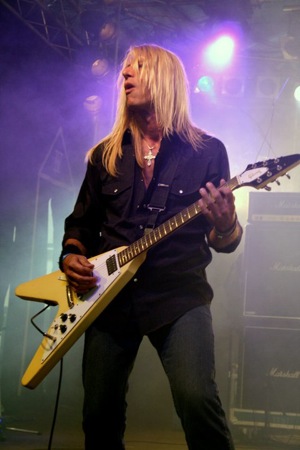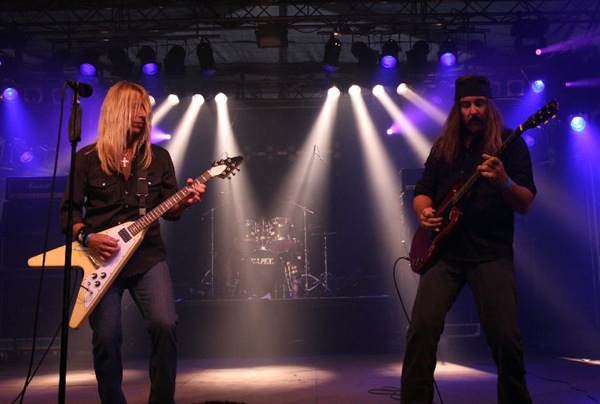Interview by Avinash Mittur
 American doom metal pioneers Trouble are back with their new studio album ‘The Distortion Field’, released via FRW Records on July 16th. The album features new vocalist Kyle Thomas (Exhorder, Floodgate) and produced by a veteran in the heavy music world, Bill Metoyer. Their first album of original material since 2007’s ‘Simple Mind Condition’, this one had the fans waiting eagerly in anticipation. A day after the release of the album, our man Avinash Mittur spoke to founding member and guitarist Rick Wartell over the telephone to discuss the album, the new vocalist and lots more. Read the conversation below.
American doom metal pioneers Trouble are back with their new studio album ‘The Distortion Field’, released via FRW Records on July 16th. The album features new vocalist Kyle Thomas (Exhorder, Floodgate) and produced by a veteran in the heavy music world, Bill Metoyer. Their first album of original material since 2007’s ‘Simple Mind Condition’, this one had the fans waiting eagerly in anticipation. A day after the release of the album, our man Avinash Mittur spoke to founding member and guitarist Rick Wartell over the telephone to discuss the album, the new vocalist and lots more. Read the conversation below.
First thing, congratulations with the release of ‘The Distortion Field’. After hearing it, I think many Trouble fans would say that it’s a much heavier record than ‘Simple Mind Condition’. What influenced you and [guitarist] Bruce Franklin to return to a heavier style than what was heard on that album?
Well, I think more than anything we wrote this album for us, with no consideration for anyone else! [laughs] We really didn’t care at that point, we figured we’re going to write whatever we want- no outside influences, no one pressuring us to get it done quickly, or write a certain way. It was a labor of love, and we wanted to do this for us basically. I think that honesty shows in the record.
I’ve had the chance to chat with the mix engineer for ‘The Distortion Field’, Bill Metoyer, once or twice here in LA, and he mentioned to me that you guys basically recorded the album yourselves?
Yeah, we did 90% of it in my office. It drove my family crazy, but they were accepting of it. Larry Burns, our live audio engineer, mic’d everything up for us and recorded everything. We took our time and did it piece by piece until we were happy with it. We then gave it to Bill so he could do his phenomenal work. It was easy then.
This wasn’t listed on the promo I was sent for the album, but who played bass on ‘The Distortion Field’?
Bruce played 90% of the bass, and I played very little. [laughs]
So how does Trouble plan to address the bass player situation live?
We’re going to introduce a new bass player in mid-August. We’re auditioning a couple potential bandmates in early August. There are two guys that we really like a lot, and they’re both more than capable and they’re both professional- it’s just a matter of Bruce and I deciding which one we want in the band at this point. We’ll introduce them in August.
On the new album there are very few psychedelic rock elements that fans heard on ‘Plastic Green Head’ and ‘Manic Frustration’. Was that just the result of you and Bruce’s current writing style?
I think there’s a little bit of psychedelic on the record, but I think we just wrote this album with more of an attitude rather than more of a psychedelic frame of mind. Like I said, we wrote it for us without influence. It was basically what we were feeling at the time I guess.
Kyle Thomas, Trouble’s current vocalist, lives in Louisiana. Was it a challenge writing and recording with him living there while you and Bruce live in Chicago?
You know, it wasn’t as hard as we thought it was going to be. Kyle is so good at what he does and he understands Trouble so well that we’d send him songs, he’d send back vocals and we’d be blown away! It would be like “yes, this is exactly what we’re looking for.” Lyrical content, melodies- he really didn’t need much critiquing, he gets it. That’s the reason he’s the vocalist for Trouble now.
What were his exact contributions to ‘The Distortion Field’? Were there any specific songs he wrote along with you guys?
Well, all the music was written before Kyle entered the band. He wrote 99% of the lyrics, and 99% of the melodies for the songs. Our goal was to bring a guy in that we didn’t have to coach and tell them what we wanted. That’s exactly what we got with Kyle. We wanted his stamp, his contribution and that’s what he gave us. I think it fits the band perfectly, we’re extremely happy with it.
So how did you guys know that he was capable of singing in this style? A lot of people know him from his time in Exhorder, and most people may not immediately hear him as good fit for Trouble after hearing that stuff.
I think it stems back to the mid-90’s when he did a string of live shows with us and we worked with him just to play those performances. He was just one of those guys where we knew that he got what we were doing at that time. Being ten years later or whatever, you only mature and understand music more, so I didn’t really have any worries about Kyle’s abilities. Like I said, as soon as we heard the first tracks that he sent us we knew that we didn’t have any concerns in that regard.
Before the album came out, [original drummer] Jeff Olson was announced as playing keys on the new album. Did this end up happening?
Yeah, he did! He did some intro work for us. We try to get Oly on every recording, one way or another. [laughs] It seems like it’s just been the protocol, he’ll come and go with the band over and over again, but no matter what we try to get him to contribute some keyboards or percussion or something in some respect.
It was funny, I can’t think of another band that’s done this but I listened to an interview that he actually conducted with you guys.
Oh yeah! That’s embarrassing. [laughs] He’s doing a radio show out of the East Coast called Heady Metal and he interviews people. He asked me if I wanted to do an interview and I said “sure, why not?”
On the liner notes to the reissue of ‘The Skull’, Bruce said that your playing style was very Michael Schenker-esque, and that it’s very precise as opposed to his looser style. Is that still the case on ‘The Distortion Field’?
I think so! Bruce has this really heavy blues feel to his playing, the guy can pull a note and make it scream, it’s amazing. I rely more on trying to fool people with speed. [laughs] Yeah, I think it’s a good combination personally, because it brings two different elements of guitar riffing to a Trouble record that work relatively well together.
It’s funny that you said that you try to fool people with speed, my favorite solo of yours is actually the one from “Victim of the Insane” where you do all sorts of cool harmonic minor stuff that’s really slow and creepy.
Yeah, well you know sometimes I get into that stuff! I just think Bruce is much better at it than I am. [laughs] But thank you though, I appreciate that.
 As we mentioned earlier, you guys went back to working with Bill Metoyer on this album. Was this a conscious decision to get a sound that resembled the first two records since he engineered them?
As we mentioned earlier, you guys went back to working with Bill Metoyer on this album. Was this a conscious decision to get a sound that resembled the first two records since he engineered them?
I don’t think that was the reason that we went back to Bill. Bruce and I were campaigning to have Bill to do the ‘Simple Mind Condition’ record as well, and it ended up not working out. When the opportunity came up for this recording, there was no question that it was going to be Bill Metoyer taking care of the controls on this thing. It was more because of the familiarity with Bill, he understands Trouble as much as anyone that I’ve ever met. He’s a phenomenal talent; he understands our lingo which is important in the studio. He’s been a friend for twenty-something years, he has that familiarity, that comfortableness that comes from working together on a project that you have a lot invested in.
So what does the phrase “The Distortion Field” actually mean? Like, what is the context for that title?
It represents the tone of the guitars. If you stand in front of a Trouble amp, there’s a big field of distortion that smacking you in the face. We were kind of pleased to name the title after something that represented the tones of our guitars for a change instead of something all deep and dark and mysterious.
I suppose the Metallica guys would have liked a name for that tone too.
[laughs] Possibly, I don’t know!
There was a rumor that Kirk Hammett and James Hetfield went to go check out you and Bruce’s rigs after a show to see how you got you guys got your tones.
We used to play in San Francisco in the early days and those guys would come to the shows and hang out. They’d come up onstage and jam with us, God knows what else they were doing up there! [laughs] Do you really think that Metallica needed to steal our guitar tones? They were already selling millions of records. [laughs] All I know is that they were up there jamming a lot, rumors are rumors.
So how do you guys plan to tour in support of ‘The Distortion Field’? US dates, European dates, what can we expect?
Well right now, we’re working on European dates for early to mid-October. We’re just going to do a handful of shows so we can introduce Kyle to the European fanbase right now. We’re going to come back and take the winter off, write some more songs possibly. I know there are plans for doing an extensive US tour in the spring of 2014, so I know people are working on that right now, we’ll put all that information up on the website as soon as it becomes available.
Moving to a different topic, the Trouble albums released on Def American, the self-titled album and ‘Manic Frustration’, are out of print. Are there any plans to get those albums reissued?
We’re working on that! The label we’re on right now, FRW Music, has the majority of our back catalog right now. We’re working on getting back those two records and re-releasing them. I know that our company attorneys are speaking with Rick Rubin’s attorneys and hopefully they can work something out so we can retain possession of those records and re-release them on FRW. That would be our ultimate goal. Whether or not that’s going to happen, you know how this lawyer stuff goes, God knows it could take forever.
One thing that I think few people recognize about Trouble is that you and Bruce were some of the first guys in metal to tune down to D, besides of course Tony Iommi who played in C-sharp for a couple albums. Where did you guys get the idea to tune so low and combine it with Judas Priest-style chugging, which is something that other bands picked up on years and years later?
It’s just the early days in rehearsals, we didn’t have digital tuners and stuff like that at the time. We were just using our ears- one day we were messing around and the lower we tuned the E-string the more gunk we were getting. It was like “man listen to that, it’s so fucking heavy! Let’s just keep it down there”. So we got tuners and figured out what would be the proper way for us to implement that, and we found that the D-tuning worked really well for the Trouble tone. I guess that’s how that would have come about.
One of my all-time favorite Trouble songs is “The Wish” from ‘The Skull’. I believe it’s still Trouble’s longest song, clocking in at around eleven minutes. Would you and Bruce ever consider writing a song that long again, or was ‘The Wish’ possibly a failed experiment in your eyes?
Actually, we love doing that stuff. Bruce and I discussed doing that before we wrote ‘The Distortion Field’. We really didn’t get to it, but we did discuss the possibility of writing a concept record with really long drawn out songs. It remains to be seen, we may still do stuff like that next time. Believe me, whenever we’re writing we think about stuff like that. Most of the time, we’ll let the song dictate where it goes, it’ll take us where it wants to go. We’re just waiting for that song to come up where it takes us on that really long adventure, and I’m sure it will.
You brought up a very important point- “next time”. In another interview you said that you wanted ’The Distortion Field’ to be a strong final Trouble album if that ended up being the case. Will there be a next album Rick?
I don’t know, that remains to be seen. We’ll continue to write and do what we do, but that’s a hard question to answer because I don’t have a definite yes or no on that. I would like there to be of course, but I would also like to know that if we didn’t do another one, then ‘The Distortion Field’ would be one where we walk away with our heads up and go “yeah, we laid it on the line and left them wanting more”. So, I don’t know.
So say that this is the last Trouble album, do you personally have another outlet for the songs that you and Bruce might write in the future?
Well, I’m always going to have an outlet for creativity. I have another band that I do work with now and again when I’m not doing stuff with Trouble called Wet Animal. Bruce has an outlet with a band called Supershine, but right now our heart and focus is on ‘The Distortion Field’ and Trouble. I think we’re going to give this 100% of our attention for quite some time.
Going back to Trouble’s history for a second, I’m sure you already knew this but thirty years ago, “The Last Judgement” was released on ‘Metal Massacre IV’. Do you still listen to that song at all? Do you still enjoy it after thirty years? It was Trouble’s first recorded appearance after all.
Oh, I listen to it every day, it’s on my iPod 24/7! No, I haven’t heard that song in probably thirty years. [laughs] It’s probably a really heavy song, but to tell you the truth I probably haven’t heard it since Metal Blade released it.
Is it still kind of odd for you to look back on the material from ‘Psalm 9’ and ‘The Skull’ considering how young and inexperienced with the industry you were at the time?
I listen to a lot of that stuff and I’ll cringe. “Oh my God, how did we let that go?” We can hear all the faults, but then you hear the cool riffs too. So yeah, it’s like a double edged sword. We’ll listen to it and think, “that sounds really cool, that was a great riff and a great time in our life”. And then we’ll hear something stupid and think “how did I let that get on a record?” It’s strange, it seems like a lifetime ago.
Is there any advice you’d give yourself from all those years ago if you had the opportunity?
Yeah! Don’t settle. Just re-record something if you know it’s not perfect. [laughs] Sometimes when you’re young and in the studio for the first time, there are things you learn about working in the studio over the years. There was our first shot at it and we did okay- we had great songs I think but we were really young and inexperienced. I would just try to come a little more prepared, let’s say that.
Did that mentality help with ‘The Distortion Field’ since you guys had all the time in the world in order to do the recording?
Absolutely, yeah. What I would do is go lay some solos down, we wouldn’t go back to recording for a week or so and I would drive around and listen to what I played, critique the hell out of it, and if I liked it or if it grew on me, I’d keep it. Otherwise I’d go back and make adjustments to it. I like doing that, I don’t know if it’s the way we should always do it because it did take so long to record the album, but it was a bonus to be able to go back and change stuff at will.
Alright, I think our time is just about up. Rick, it was a pleasure talking with you, best of luck with the album and the touring.
Excellent, well thank you for the time, it was a pleasure.
Related: Trouble ‘The Distortion Field’ album review
newtrouble.com
facebook.com/TroubleChicago

